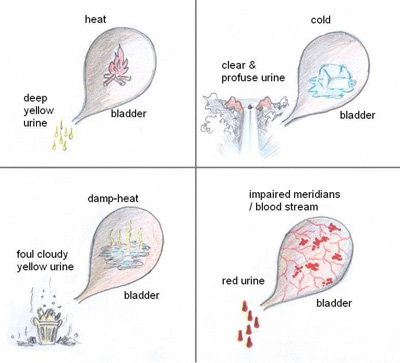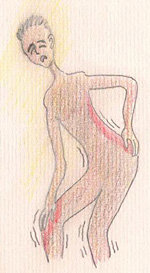Examine Your Urine
Under normal circumstances, an individual usually urinates four to six times during the day; it is considered normal to get up once during the night. The amount of urine is about 1.5 ~ 2 L /day. The frequency and amount of urination can vary according to our drinking habits, temperature, amount of sweat produced and age. By checking our urination daily, we can learn about not only the state of our body fluids, but also the state of the organs involved in this process. Let's see how TCM interprets certain urine qualities listed below:
| Nature of Urine |
 |
- Deep yellow urine can indicate heat accumulation.
- A strong smell of urea may be due to hyperactive heat in the heart and bladder.
- Cloudy yellow urine with a foul odor is mainly due to damp heat pouring down in the bladder.
- Clear, odorless and profuse urination pertains to a deficiency cold syndrome.
- Clear and profuse urine in an exogenous febrile illness means the evil has not yet entered the interior part of the body.
- When the urine turns clear in febrile illnesses, it indicates an individual will recover soon.
- Red urine means the blood stream and the meridians are impaired by heat evils.
|
 |
| TCM checks bodily balance by assessing the nature of urine. |
|
 |
Volume of Urine
- Profuse, clear urine and polyuria (excessive passage of urine) at night are due to insufficiency of kidney yang.
- Diabetes is a disease characterized by excessive thirst and polyuria.
- Scanty, yellow urine can be caused by excessive heat, over sweating, vomiting and diarrhea due to the over consumption of body fluids.
- Scanty urine accompanied with edema (general swelling) can be seen in yang deficiency of the lungs, spleen or kidneys; because, the organs are unable to vaporize body fluids and cause water-dampness retention.
|
 |
Urinary Frequency
This refers to an increase in the frequency of urination; the amount of urine may be normal or increased.
- Frequent urination with a large amount of clear urine is due to kidney qi failing to consolidate urine in the bladder.
- Frequent urination, urgency with a small amount of deep-yellow urine or even with bloody or painful urination is due to damp-heat in the bladder.
- An increase in nocturnal (night) urination with clear urine is seen in late stage kidney disease or aged people where the kidney-yang fails to control the urine excretion.
|
 |
Difficult urination
Urination characterized by dripping due to difficulty in passing urine, also called dysuria in TCM. This problem may be caused by several conditions.
- Damp heat in the bladder: This condition is characterized by scant and deep yellow urine; there is urgency, a burning sensation and stabbing pain during urination. Other associated symptoms are a bitter taste in the mouth, thirst but with no desire to drink, distension in the lower abdomen and constipation.
On examination, the tongue is red and covered by yellow and greasy fur; the pulse is rapid.
- Excessive heat in the lungs: Individuals have difficult or dripping urination excreting small amounts of deep-yellow urine. Accompanying symptoms are throat dryness, irritability, and thirst with drinking a lot of water. Breathing is short and rapid, or a cough may be present.
On examination, the tongue is covered by yellow and thin fur; the pulse is rapid.
 |
- Qi stagnation in the liver: Individuals have urinary difficulty which arises from emotional disturbances; other symptoms are distention in the abdomen and rib sides, depression, irritability and being easily angered.
On examination, the tongue is red and covered by yellow and thin fur; the pulse is taut.
|
 |
| Emotional disturbances affect liver function and may result in urinary difficulty. |
|
- Qi deficiency in the middle burner: Individuals have an urge to urinate but are unable to void or can only discharge a small amount of urine. The usual accompanying symptoms are heaviness and distention in the lower abdomen, poor appetite, fatigue, shortness of breath and weak speech with a low voice.
On examination, the tongue is pale and covered by thin fur; the pulse is thready and weak.
- Exhaustion of kidney yang: Individuals have urinary difficulty or dribbling after voiding, but the voiding is effortless. Associated symptoms are soreness and weakness in the back and knees, a dull pale facial complexion and an aversion to cold and fatigue.
On examination, the tongue is pale and bulky; the pulse is deep and fine.
|
|

Symptoms like soreness and weakness in the back and knees are usually asociated with kidney disorders. |
- Urinary blockage: Individuals have dribbling urination or excrete urine in a thin stream. In severe cases, there is no urine excretion. The usual accompanying symptoms are back pain and distention in lower abdomen.
On examination, the tongue is dark purple, bruised spots may appear on its surface; the pulse is hesitant. Stones or a blood clot may block the urinary track. This is a serious condition that should be brought to the attention of a doctor right away especially if no urination is occurring.
|
Urine Retention
Absence of urine discharge even though there is an urge to urinate. This is also called anuria in TCM.
- In the elderly, if the bladder is distended but unable to void or only excrete a few drops, this is due to kidney-qi deficiency.
- In pregnant women, inhibited urination is usually due to qi deficiency in the middle burner, which causes the fetus to press down on the lower part of the bladder (located in the lower burner region) and resulting in difficult release of urine.
- Inhibited urination after delivery is usually a result of blood stasis or swelling of the uterus, which causes pressure on the bladder and urethra.
|
 |
Urinary Incontinence
Incontinence of urine refers to an involuntary passage of urine in a conscious state. It indicates a failure of kidney-qi consolidation or dysfunction in the bladder.
Enuresis
Enuresis refers to involuntary discharge of urine during sleep (bed wetting). In children, it is due to immaturity or kidney-qi insufficiency. In adults, it is due to kidney-qi failing to consolidate the bladder, a deficiency-cold in the lower burner or a primordial energy deficiency. |
 |
|